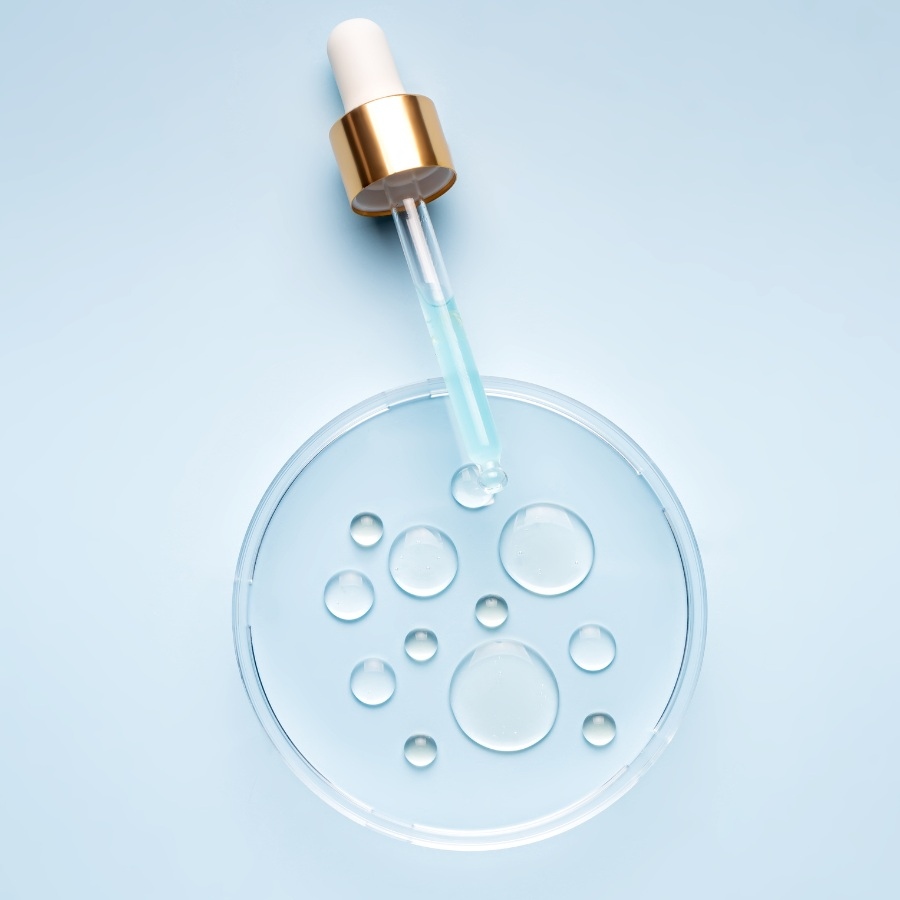Hyaluronic Acid Serum For Facial Treatments
If you haven't heard about the great benefits of hyaluronic acid (HA) serum, then you have come to the right place to learn everything there is to know about this wonder serum. It's loved by people of all ages mainly because of its plumping and glowy effect on the skin. People use hyaluronic acid in various forms including masks and injectables. To make it simple, hyaluronic acid is naturally produced by our body that is important for moisture and elasticity. However, as we age over time, the number of hyaluronic acid decreases.
Luckily, people of great minds were able to formulate a hyaluronic acid serum that can replenish and aid in restoring moisture. Let's deep dive into more key facts of Hyaluronic Acid Serums.
Hyaluronic Acid Serum For Professional Use
Professional Hyaluronic Acid Serums For Estheticians
Hyaluronic acid serums are commonly found in your favourite health and beauty stores. Many estheticians also use hyaluronic acid serums as part of their skin treatment procedures including facials, LED treatment, microneedling, and many more. You may also find hyaluronic acid injections that are commonly used by professionals for a more in-depth effect.
What Does Hyaluronic Acid Serum Do?
Hyaluronic acid serum helps our skin stay moisturized throughout the day by pulling and holding water to the surface of the skin. It has a humectant property that draws moisture after applying skincare products like moisturizers. Imagine it like a sponge that holds onto the water absorbed to contain and keep it as long as possible. Thus, infusing all layers of the skin with long-lasting hydration.
What Is Hyaluronic Acid Serum Good For?
Hyaluronic acid serum gives countless health benefits, especially for our skin. It helps hydrate dry skin and diminish the presence of wrinkles and fine lines. It also helps reduce other skin conditions including redness, pigmentation, saggy skin and dermatitis. If used as injectables, hyaluronic acid can be used as fillers to improve the skin's elasticity, making it look supple and younger-looking.
When To Use Hyaluronic Acid Serum?
If you're using a hyaluronic acid serum, it's best to apply it on damp skin. After cleansing your face, add a few drops of serum on the palm of your hands and gently tap it on your skin. It can be applied twice a day, in the morning and before going to bed.
Can Hyaluronic Acid Cause Acne?
Acne or breakouts can occur for various reasons. The most common reasons why people have acne after using a product are purging and blocked pores. Purging happens when there is increased skin cell turnover or skin shedding. The more the skin sheds, the faster it is for pimples to be resurfaced.
However, Hyaluronic Acid acts as a humectant and does not really increase skin cell turnover. Its job is to draw water into your outer layer skin from the underlying skin and the environment. If you live in a dry environment, have dry skin or overuse hyaluronic acid, it can worsen your dry skin and cause acne. If you are using hyaluronic acid containing AHA, BHA, or retinoid, this can likely cause acne as well.
Hyaluronic Acid Serum Benefits
Hyaluronic Acid is known to have anti-aging benefits for it makes the skin firmer and enhances skin elasticity. People with dry skin or more mature skin can benefit from this serum for its hydrating properties that increase skin moisture by drawing large amounts of water into the skin.
Hyaluronic Acid Serum Results
With its anti-wrinkle properties, hyaluronic acid can significantly diminish the appearance of wrinkles and fine lines by filling up and stretching the wrinkles with water to make the skin plumper. The skin will look fresh and bouncy with increased hydration and reduced roughness. Moreover, it improves the skin's overall skin tone and reduces pigmentation as it smoothens the rough skin.
Hyaluronic Acid Serum Side Effects
Because Hyaluronic Acid occurs naturally in our body and is safe for all skin types, it rarely has any side effects. However, you may see slight differences in effects depending on the size of hyaluronic acid molecules. Some products may have higher or lower molecular weights. The lower the hyaluronic acid molecular weight, the more it penetrates the skin which can be too much for some skin types.
Using the wrong type of Hyaluronic Acid can lead to inflammation, dryness or irritation. If you experience these side effects, stop using the product or change to a different one. You may experience some side effects especially if you are using hyaluronic acid combined with other ingredients.
How To Store Hyaluronic Acid Serum?
For a soothing skin regimen, you can chill hyaluronic acid serum in the fridge. You'll feel refreshed as you slather a chilled serum that can help lock in hydration.
Hyaluronic Acid Serum For Different Skin Concerns
Hyaluronic Acid Serum For Acne
Many people have a common misconception that they should avoid moisturizers if they are suffering from acne. This misconception should be disregarded as all the more you need moisture on your skin to balance the oil production. If your skin is too dry, it overproduces oil which can lead to acne. Use hyaluronic acid serum to keep your skin hydrated and balance oil production. Although it won't fill in acne scars, it will decrease redness which diminishes the appearance of red acne scars. Moreover, it serves as a skin barrier to help protect the skin from environmental factors.
Hyaluronic Acid Serum For Oily Skin
If you're worried about oil clogging your pores, then using a lightweight hyaluronic acid serum won't give you any problems with this concern. It moisturizes your skin without leaving heavy residue that can cause clogged pores. The more you hydrate your skin, the skin maintains a healthy balanced production of oil.
Hyaluronic Acid Serum For Sensitive Skin
People with sensitive skin would be glad to know that hyaluronic acid serum is especially gentle and works wonders for all skin types. Its calming effect makes it safe to use for sensitive and blemish-prone skin since the ingredient is naturally produced by the body. When hyaluronic acid is used, the skin will only have natural reactions to the product.
Hyaluronic Acid Serum For Lips
A few drops of hyaluronic acid serum on the lips are incredibly helpful, having moisturized results in a matter of seconds. People with chapped lips can apply hyaluronic acid serum to hydrate and nourish the lips.
Hyaluronic Acid Serum Under Eyes
Using hyaluronic acid serum around the eyes can help reduce dark circles and puffy eyes. Its moisturising benefits can help diminish wrinkles and fine lines around the eyes, which can make the area firmer.
What Facial Treatment To Offer For My Clients?
Hyaluronic Acid Serum With Niacinamide
Niacinamide is a vitamin B3 that helps prevent moisture from escaping the skin. You can use both hyaluronic acid serum and niacinamide together. It is safe and compatible to infuse in a client’s skin regimen as both are water-based products and are suitable for all skin types. It is recommended to apply hyaluronic acid serum first before applying niacinamide. The reason for this step is that hyaluronic acid serum would be able to seal in more water first before niacinamide helps in controlling oil production and minimizing pores.
Hyaluronic Acid Serum With Vitamin C
Vitamin C is probably the most popular and common vitamin to consume. It can be found in fruits and vegetables, and most especially in most skincare products since it has antioxidant properties. It helps in the production of collagen and elastin, which plays a key role in having younger-looking skin. When hyaluronic acid serum and vitamin C are used together, it gives a powerful anti-ageing effect to the skin. Use hyaluronic acid serum first to allow total hydration before putting on a vitamin C skincare product that will brighten and even out the skin tone.
Is Hyaluronic Acid Good After Microneedling
It is actually recommended to apply hyaluronic acid after a microneedling treatment, mainly because it promotes better absorption of the product. It helps activate collagen production and secure the much-needed moisture after the treatment.
Hyaluronic Acid Serum After Dermaroller
Dermaroller is effective in treating skin pigmentation and dry skin. If used together with hyaluronic acid serum, it gives a strong youthful glow inside-out since it hydrates the skin for firm plump skin. It is also suggested to use them together at the same time, and not just after since it allows fast absorption of the product while making tiny holes from the dermaroller.
Hyaluronic Acid Serum With Peptides
Peptides are amino acids essential for collagen and elastin production. If you're using products with peptides, it can give a youthful glow and help improve acne problems. It is safe to use hyaluronic acid and peptides together, for as long as you follow the correct order. The correct order will depend on the type of product you are using such as moisturisers, cream, serum, oil, and the like. For instance, you should use hyaluronic acid serum first to draw in more water and then use a cream to lock in moisture.
Hyaluronic Acid Serum After Chemical Peel
Chemical peels can cause red flaky skin. After a chemical peel, it causes temporary side effects such as tingling, burning, and swelling of the skin. Simply imagine having a mild sunburn that has caused all these symptoms after the treatment. Thus, total hydration is going to be an integral part of the chemical peel journey. With the help of hyaluronic acid serum, it helps soothe the skin to gently relieve the side effects.
Hyaluronic Acid Serum After Microdermabrasion
Microdermabrasion is a skincare procedure that involves exfoliating the skin with a hand-held device. Since the skin exfoliates and removes dead skin cells, it is then replaced by new skin growth that can help reduce the signs of ageing. Hyaluronic acid serum is perfect after a microdermabrasion treatment for its hydrating properties. It helps draw in moisture that will aid in faster healing of the skin.
Hyaluronic Acid Serum After HydraFacial
Hydrafacial is a facial treatment that involves a deep-cleanse, exfoliation and hydration. If used together with a hyaluronic acid serum, it will add nourishment to the skin as an additional boost.
Hyaluronic Acid Serum After LED Facial
LED Facials use a device that emits red or blue lights of different wavelengths. It is used to diminish signs of aging including wrinkles and fine lines. People with certain skin conditions like acne and pigmentation can also benefit from this treatment. When paired with hyaluronic acid serum, you'll discover the benefits of the combination including better absorption of the product and hydration.
Hyaluronic Acid Serum Alternatives
Hyaluronic Acid Serum Vs. Retinol
Hyaluronic Acid and Retinol are both powerful ingredients that are loved by many. What's the difference? - Retinol is a form of vitamin A that is used to tighten pores and give the skin a healthy glow by stimulating collagen and elastin production. There's no easy way to say which one is better since both ingredients have their own purpose. Hyaluronic acid works in repairing and hydrating the skin, whereas retinol penetrates more on the underlying tissues of the skin for a youthful effect. Both products are compatible to use together and help each other give the skin the nourishment it needs.
Hyaluronic Acid Serum Vs. Vitamin C Serum
You'll find hyaluronic acid and vitamin C used together in skincare products since both ingredients go well together. Each ingredient has its own function for optimal skin health so you can't really compare which one is better. Hyaluronic acid serums keep the skin hydrated for a long time, whereas a vitamin C serum works to protect the skin from excessive sun damage. Hyaluronic Acid serums compensate for the effects of a vitamin C serum by not overworking the skin but instead, it nourishes and allows the skin to repair itself.
Hyaluronic Acid Serum Vs. Glycolic Acid
Glycolic acid comes from the alpha hydroxy acid (AHA) group. It is found in fruits and is considered among the safest AHAs to use. Glycolic acid can be used in many ways including treating acne and promoting anti-aging effects. Choosing between the two would depend on which skin condition you would like to treat. If your goal is to moisturize the skin, use a hyaluronic acid serum. If you need to treat and reduce breakouts, then a glycolic acid serum is a good option.
Hyaluronic Acid Serum Vs. Moisturizer
Although both types have the same purpose of hydrating the skin, the only difference is the molecular size. Moisturizers have larger molecules that only penetrate the outer layer of the skin with the sole purpose of locking in moisture. If you're using hyaluronic acid serum, it penetrates deep into the underlying tissues which increase the effectiveness of the ingredient. The two types can be used together, provided you apply the serum first, and then the moisturizer to form a barrier and prevent the moisture from escaping.
Hyaluronic Acid Serum Vs. Collagen Serum
Collagen is another component that is naturally produced by the body. It is known to be beneficial for skin elasticity and healthy hair. Without collagen, our hair becomes brittle and the skin can become dry and form wrinkles. Both can be used together as they complement each other very well. Collagen is great for skin elasticity to create a youthful glow, whereas a hyaluronic acid serum can draw in and retain the collagen needed.
FAQs
How To Apply Hyaluronic Acid Serum?
It's important to apply hyaluronic acid serum properly, in the right environment, and in the correct order of the skin regimen. Always remember to use hyaluronic acid in a humid environment rather than a dry one. The reason for this is because hyaluronic acid can pull in moisture from external forces rather than pulling in moisture from your underlying skin. If the hyaluronic acid serum draws moisture from the underlying skin, all the more the skin becomes dry from within. The best way to apply hyaluronic acid serum is to apply it on damp skin and then seal in the moisture with a moisturizer or a cream. Afterwards, you can also top it off with oil for extra hydration.
Should Hyaluronic Acid Be Refrigerated?
Although it is not necessary to store the hyaluronic acid serum in the refrigerator, you can still keep it there since it is a water-based product. Putting it in the fridge won't affect the efficacy of the product. In fact, all the more it enhances the experience with a soothing effect.
Can Hyaluronic Acid Be Used With Retinol?
Yes, hyaluronic acid can be used with retinol since both products are beneficial to the skin's health. Both products are safe to use together as each has a different function for the skin. While hyaluronic acid is to repair and retain moisture and nutrients, retinol's job is to stimulate collagen production.
Hyaluronic Acid Serum Before Or After Vitamin C?
It doesn't matter which ingredient goes first. What's important is the type of product used, whether it's a moisturizer, cream or serum. As a rule of thumb, always use thinner products first, before sealing them in with a heavier or thicker product. For instance, use the hyaluronic acid serum first before a vitamin C-infused moisturizer, but use a vitamin C serum first before applying a hyaluronic acid moisturizer.
Hyaluronic Acid Serum Before Or After Retinol?
Always remember to use thinner products before the thicker ones. However, if you're using both serums of hyaluronic acid serum and retinol, then we suggest using retinol first before applying hyaluronic acid serum. After putting retinol on the skin, it can help retain the moisture and nutrients by applying the hyaluronic acid serum after a few minutes. When applying multiple products, allow the first product to soak in and be absorbed by the skin before applying the next one.
When To Use Hyaluronic Acid Serum In Routine?
Hyaluronic acid serum can be applied twice a day on clean damp skin. Put this on before applying a heavy moisturizer. Moisturizers or cream will act as the barrier to prevent moisture from escaping or evaporating.
How Long Does Hyaluronic Acid Serum Last?
If stored properly in the right conditions, hyaluronic acid serum can last up to a year. However, always check the label for expiration dates after a product is opened.
Does Hyaluronic Acid Serum Expire?
Yes, all products always have an expiration date especially when opened and used. You can check the back of the product where you'll find the number of months it will last for. Having expired products can have tainted ingredients, thus, they may not work properly and cause side effects on the skin.
Is Hyaluronic Acid Serum Good For Rosacea?
Yes, it is effective and gentle in treating people with rosacea. It is extremely hydrating without irritating the skin and helps soothe redness.
How Much Hyaluronic Acid Serum Should I Use For One Facial?
Only apply the amount of serum needed by the skin. Too much hyaluronic acid serum can cause excessive dryness of the skin.
The Lowdown Of Hyaluronic Acid Serums
The Pros And Cons Of Hyaluronic Acid Serums
We've already established that hyaluronic acid is a naturally occurring substance of the body, which makes it safe to use for the skin. It's a great moisturising ingredient that helps reduce anti-aging effects. As a result, we can have dewy, fresh, even-tone, and firmer skin. As great as it may sound, there is always a downside to any product. Using hyaluronic acid serum alone doesn't really cause skin irritations.
However, if the product you are using is combined with other ingredients, you might have to check if those ingredients also work well for you. Some combinations of products can be unsuitable for some skin types. It can cause allergies, rashes, or other skin irritations. Thus, always do a patch test before applying a new skincare product to prevent your skin condition from worsening.
To sum it up, hyaluronic acid serums are a great addition to your skincare routine, especially if you think you're not producing enough hyaluronic acid in your body due to aging. As long as you use the product correctly and follow the necessary precautions, then hyaluronic acid serum will work perfectly in achieving healthier skin.



































